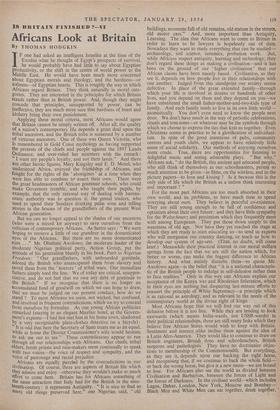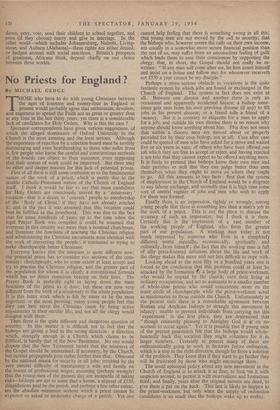IS BRITAIN FINISHED ?ŌĆöVI
Africans Look at Britain
By THOMAS HODGKIN IF one had asked an intelligent Israelite at the time of the Exodus what he thought of Egypt's prospects of survival, he would probably have had little to say about Egyptian productivity, or the shift in the centre of world power to the Middle East. He would have been much more concerned about Egyptian morals and theology, and the hardnessŌĆöor softnessŌĆöof Egyptian hearts. This is roughly the way in which Africans regard Britain. They think naturally in moral cate- gories. They are interested in the principles for which Britain stands rather than in British power. And, though they might concede that principles, unsupported by power, can be ineffective, they are much more sure that hardness of heart and idolatry bring their own punishment. Applying these moral criteria, most Africans would agree that Britain cannot be simply written off. After all, the quality of a nation's contemporary life depends a great deal upon the tribal ancestors, and the British tribe is sustained by a number of virtuous ancestors. One of these was Queen Victoria, who Is remembered in Gold Coast mythology as having supported the protests of the chiefs and people against the 1897 Lands prdinance, and over-ruled her ministers with the remark: I want my people's loyalty, and not their lands." And there are other heroic figures, Mary Kingsley and E. D. Morel, who understood Africa, enjoyed the friendship of Africans, and fought for the rights of the ' aborigines ' at a time when they were less able to combine tct assert their own. There were the great headmasters of African grammar schools, who could make Governors tremble, and who taught their pupils, by example, that the only rational way of dealing with bureau- cratic authority was to question it; the ŌĆó genial traders, who Used to spend their Sundays drinking palm wine and telling stories in the houses of the grandfathers of the present West African generation. But we can no longer appeal to the -shades of our ancestors (who were a mixed lot anyway) to save ourselves from the criticism of contemporary Africans. As Sartre says : " We were hoping to retrieve a little of our grandeur in the domesticated eyes of the Africans. But there are no more domesticated eyes._ ." Mr.' Obafemi Awolowo, the moderate leader of the moderate Nigerian political party, Action Group, put the attitude of his generation bluntly in his book, Path to Nigerian Freedom: " Our grandfathers, with unbounded gratitude, adored the British who emancipated them from slavery and saved them from the ' horrors ' of tribal wars. Our immediate fathers simply toed the line. We of today are critical, unappre- ciative, and do not feel that we owe any debt of gratitude to the British." If we recognise that there is no longer an accumulated fund of goodwill on which we can hope to draw, that we must be judged on our present conduct, how do we stand ? To most Africans we seem, not wicked, but confused, and involved in frequent contradictions, which we try to conceal from ourselves by formulae. As one young African politician remarked (staying in an elegant Mayfair hotel, at the Govern- ment's expenseŌĆöI had last met him in his home town, shadowed by a very recognisable plain-clothes detective on a bicycle): " It is odd that here the Secretary of State treats me as an equal, while at home the District Commissioner's wife would hesitate to ask me out to tea." These contradictions appear to run through all our relationships with Africans. Our chiefs, tribal elders, fetish priests and rain-makers seem continually to speak With two voicesŌĆöthe voice of respect and sympathy, and the voice of patronage and racial prejudice. Africans are equally puzzled by the contradictions in our eivilisatiop. Of course, there are aspects of British life which they admire and enjoyŌĆöotherwise they wouldn't make so much effort to come here. Britain has for Africans something of the same attraction that Italy had for the British in the nine- teenth-century : it represents Antiquity. " It is nice to find so many old things preserved here," one Nigerian said, " old buildings, museums full of old remains, old statues in the streets, old motor cars." And, more important than Antiquity, Learning. The idea that Africans want to come to Britain in order to learn to be lawyers is hopelessly out of date. Nowadays they want to study everything that can be studiedŌĆö archaeology, soil science, ceramics, probation work. But, while Africans respect antiquity, learning and technology, they don't regard these things as making a civilisationŌĆöand it has been on the ground of our ' higher civilisation' that our African claims have been mainly based. Civilisation, as they see it, depends on how people live in their relationships with one another. Judged from this standpoint our society seems defective. In place of the great extended familyŌĆöthrough which your life is involved in dozens or hundreds of other lives, and you depend on them and they depend on youŌĆöwe have substituted the small father-mother-and-two-kids type of family. And each family tends to live in its own little world- atomistically. You don't even need to know the people next door. We don't have much in the way of periodic celebrations, rituals and tom-tomsŌĆöor whatever may be the symbols through which we choose to express the ties that knit us together. Even Christmas seems in practice to be a glorification of individual- ism. In spite of the good intentions of pubs, community centres and youth clubs, we appear to have relatively little sense of social solidarity. Our methods of enjoying ourselves seem crude. True, there are opportunities for listening to delightful music and seeing admirable plays. " But why," Africans ask, " do the British, this ancient and educated people, who still think of themselves as our schoolmasters, permit so much attention to be givenŌĆöin films, on the wireless, and in the picture papersŌĆöto love and kissing ? Is it because this is the only side of life which the British as a nation think interesting and important " For the most part Africans are too much absorbed in their own world, and its problems, to have much time to spend worrying about ours. They believe in peaceful co-existence. They are still young enough to be full of confidence and optimism about their own future : and they have little sympathy for the Weltschmerz and pessimism which they frequently meet with among Europeans. They put those down simply to the weariness of old age. Nor have they yet reached the stage at which they are ready to start educating usŌĆöto send us experts who will reorganise our country dancing, or teach us how to develop our system of age-sets. (That, no doubt, will come later.) Meanwhile their practical interest in our moral welfare springs from the fact that we are still the nation which, for better or worse, can make the biggest difference to African history. And what mainly disturbs themŌĆöto quote Mr. Awolowo againŌĆöis the belief that " it is a national characteris- tic of the British people to indulge in self-delusion rather than to face realities." Only in this way can Africans explain our acceptance of the Kenya war and Rhodesian federation, which in their eyes are nothing but despairing last-minute efforts to reassert the principle of White SupremacyŌĆöa principle which is as rational as astrology, and as relevant to the needs of the contemporary world as the divine right of kings. Most Africans hope that we will find our way out of this delusion before it is too late. While they are tending to look eastwards (which means India-wards, not USSR-wards) in their political relationships, there are still many links which they believe free African States would wish to keep with Britain. Sentiment and interest alike incline them against the idea of a Latin Afro-America. They would like to continue to draw on British engineers, British dons and schoolteachers, British surgeons and pathologists. They have no doctrinaire objec- tions to membership of the Commonwealth. But everything, as they see it, depends upon our backing the right horse, and recognising that, if we continue to back the whole fieldŌĆö or back the wrong horse, but.give it a new nameŌĆöwe are bound to lose. For Africans also see the world as divided between Civilisation and Barbarism, between the forces of Light and the forces of. Darkness. In the civilised worldŌĆöwhich includes Lagos, Dakar, London, New York, Moscow and BombayŌĆö Black Men and White Men can eat together, drink together, dance, pray, vote, send their children to school together, and, even (if they choose) marry and give in marriage. In the other worldŌĆöwhich includes Johannesburg, Nairobi, Living- stone, and Auburn (Alabama)ŌĆöthese rights are either denied, or hedged around with social sanctions. Britain's prospects of greatness, Africans think, depend chiefly on our choice between these worlds.



















































 Previous page
Previous page